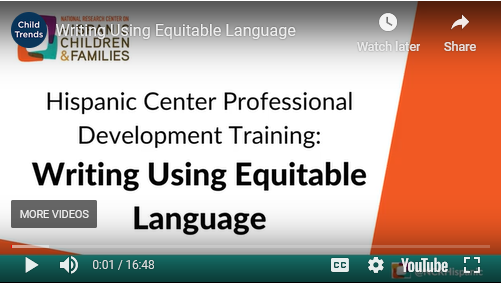Mar 29, 2019
Fact Sheets and Guides
Recommendations for Supporting Emerging Scholars
Authors:
Bringing new (or emerging) researchers into a research or practice field and supporting their ability to engage in high-quality work is essential to that field’s long-term sustainability and growth. Over the past five years, the National Research Center on Hispanic Children & Families (NRCHCF) has engaged in a range of activities designed to support emerging scholars—including undergraduates, graduate students, and early career professionals—interested in studying Hispanic children and families. Below, we detail some recommendations based on our efforts to help other groups and organizations in their own efforts to recruit emerging scholars, no matter the field.
Identify Emerging Scholars
Utilize a multi-pronged approach to identify and connect with emerging scholars.
- Reach out to graduate programs and university centers with known topical expertise (e.g., Hispanic children and families) to identify and recruit emerging scholars.
- Leverage your own professional networks (e.g., email colleagues to have them refer emerging scholars).
- Attend professional conferences and other relevant meetings. Conference attendance facilitates publicity for your own group’s work and creates opportunities to connect with and identify emerging scholars with similar interests; be sure to check out poster sessions, which often highlight the work of emerging scholars.
- Connect with relevant professional organizations, listservs, and networking forums that may facilitate access to emerging scholars.
Social media can be an effective way to identify, recruit, and actively engage emerging scholars on an ongoing basis.
The pool of emerging scholars is constantly changing, so keep in mind that one must identify these researchers on an ongoing basis. Likewise, the platforms that emerging scholars use to connect with one another and with other professionals in the field evolve over time. Consider how LinkedIn, Twitter, and other emerging forms of social media can help you reach and engage with a new generation of scholars.
Build a Network
Groups and organizations can increase capacity by building a network that allows you to engage with emerging scholars on an ongoing basis, and to help them connect with each other and potential mentors in the field. For example, the NRCHCF created a database of emerging scholars to store contact information, affiliations, and topic areas of interest. This database is used to identify, contact, and connect with more targeted subgroups of emerging scholars. The NRCHCF also disseminates professional development opportunities (e.g., jobs announcements, conferences, webinars, funding announcements) via email or e-newsletter to members of the database. In addition, we use an online platform (in our case, LinkedIn) to connect emerging scholars with each other and with potential mentors in the field. This forum has been especially useful in fostering collaborations for conference submissions and discussions on professional development activities.
Be aware: Achieving active participation in an online forum requires regular outreach, careful facilitation, and encouragement, as emerging scholars can be hesitant to engage. Remember to invite emerging scholars to join and actively participate in the network at all opportunities (e.g., at conferences, or when disseminating publications) and regularly update the database with new additions.
Engage Targeted and Broader Audiences
Engaging emerging scholars who focus specifically on your topical area of interest (in our case, Hispanic children and families) is necessary to build capacity in the field. Accordingly, we find that emerging scholars thrive when they can connect with others who share their focus. In addition, it is important to reach broader groups of emerging scholars with related interests. For the NRCHCF, this has included family, child development, economic, and policy scholars; building research capacity more broadly includes facilitating awareness in other fields of the growing population of Hispanic children and families, and how understanding the Hispanic population is important to their work.
Not all scholars may understand the relevance of your topical focus to their own work. To increase this understanding, it is important to engage broad audiences of emerging scholars, especially if you can draw connections between your work and their own work.
Make Connections and Build Relationships
As you facilitate activities to support emerging scholars, it is critical to make connections and build ongoing relationships with other individuals and organizations within the field. These connections can generate interest and engagement in collaborative activities and events and expand the network of emerging scholars. For example, webinars to support emerging scholars are stronger and have broader reach if they include external experts; relationships and connections are key to effectively engaging these external experts. Similarly, relationships and connections also facilitate in-person mentoring events, such as a mentoring breakfast or lunch at a professional meeting. In our experience, hosting emerging scholar activities with partner organizations has enabled us to access additional resources (funding and in-kind logistical support) and has greatly extended the scope and reach of activities beyond what would have been possible on our own.
Close collaboration with researchers and organizations ensures successful in-person mentoring events.
Conduct Interactive Activities
For the NRCHCF, interactive activities have been the most successful in terms of participation, engagement, and feedback. Designing engaging, interactive activities for emerging scholars requires considerable effort, but can increase their participation and improve the resulting experience. In-person fellowships support the most intensive relationships between mentors and emerging scholars, but are often limited in reach because of their cost in time and funding. The NRCHCF has had great success reaching a larger number of emerging scholars by hosting in-person mentoring and networking events at national conferences. At these events, we’ve placed emerging scholars and leaders in the field into small groups organized by content (e.g., early childhood, work and family) or professional development areas of interest (e.g., applying to graduate school, finding nonacademic research positions), and we’ve developed tailored discussion topics and questions to facilitate discussions for each group. Repeating these events annually increases engagement and, in some cases, allows the partnering organizations to build their own hosting capacity. It can be particularly valuable to encourage ongoing contact between emerging scholars and leaders in the field who originally connect at these events.
Conducting interactive, in-person mentoring events at conferences allows you to reach a large group of emerging scholars in a cost-effective way.


